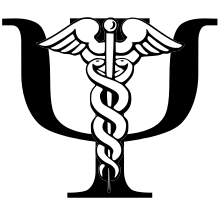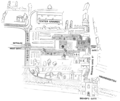Portal:Psychiatry
The Psychiatry Portal Psychiatry is the medical specialty devoted to the diagnosis, prevention, and treatment of deleterious mental conditions. These include various matters related to mood, behaviour, cognition, perceptions, and emotions. Initial psychiatric assessment of a person begins with creating a case history and conducting a mental status examination. Physical examinations, psychological tests, and laboratory tests may be conducted. On occasion, neuroimaging or other neurophysiological studies are performed. Mental disorders are diagnosed in accordance with diagnostic manuals such as the International Classification of Diseases (ICD), edited by the World Health Organization (WHO), and the Diagnostic and Statistical Manual of Mental Disorders (DSM), published by the American Psychiatric Association (APA). The fifth edition of the DSM (DSM-5), published in May 2013, reorganized the categories of disorders and added newer information and insights consistent with current research. Treatment may include psychotropics (psychiatric medicines) and psychotherapy, and also other modalities such as assertive community treatment, community reinforcement, substance-abuse treatment, and supported employment. Treatment may be delivered on an inpatient or outpatient basis, depending on the severity of functional impairment or risk to the individual or community. Research within psychiatry is conducted on an interdisciplinary basis with other professionals, such as epidemiologists, nurses, social workers, occupational therapists, and clinical psychologists. (Full article...) Selected article The most common form of self-harm is skin-cutting but self-harm also covers a wide range of behaviors including, but not limited to, burning, scratching, banging or hitting body parts, interfering with wound healing (dermatillomania), hair-pulling (trichotillomania) and the ingestion of toxic substances or objects. Behaviours associated with substance abuse and eating disorders are usually not considered self-harm because the resulting tissue damage is ordinarily an unintentional side effect. However, the boundaries are not always clearly defined and in some cases behaviours that usually fall outside the boundaries of self-harm may indeed represent self-harm if performed with explicit intent to cause tissue damage. Although suicide is not the intention of self-harm, the relationship between self-harm and suicide is complex, as self-harming behaviour may be potentially life-threatening. There is also an increased risk of suicide in individuals who self-harm to the extent that self-harm is found in 40–60% of suicides. However, generalising self-harmers to be suicidal is, in the majority of cases, inaccurate. (Full article...) Selected image Australian soldiers near Ypres in 1917, during World War I. Soldier on left is likely suffering from shellshock, now described as Posttraumatic Stress Disorder image credit: public domain
WikiProjectsSelected biography General imagesThe following are images from various psychiatry-related articles on Wikipedia.
Related portalsTopicsSubcategoriesAssociated WikimediaThe following Wikimedia Foundation sister projects provide more on this subject:
Discover Wikipedia using portals |
































